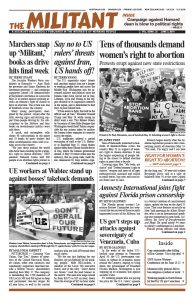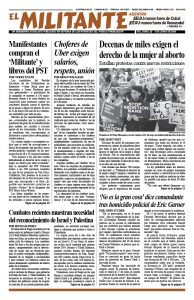In the wake of the failed U.S.-backed coup attempt in Venezuela April 30, the U.S. government continues to tighten its economic noose around the country, hoping to bring down the government of President Nicolás Maduro. Washington is also stepping up its economic war against socialist Cuba.
It’s working people who are paying the price for the U.S. rulers’ squeeze and the White House’s threats of imperialist military intervention in violation of Venezuelan sovereignty.
U.S. officials state that a direct U.S. military intervention remains one option “on the table” and have threatened to impose a complete blockade on revolutionary Cuba — which would be equivalent to an act of war — for its principled solidarity with Venezuela. In response, the Socialist Workers Party and its candidates have joined in and initiated protest actions in New York, Los Angeles, San Francisco, Seattle, Chicago and other places demanding U.S. hands off Venezuela! U.S. hands off Cuba!
On May 10 Secretary of the Treasury Steven Mnuchin imposed sanctions on two maritime companies that had transported oil from Venezuela to Cuba as part of longtime agreements. All property and bank accounts of the two companies in the U.S. were frozen.
On May 15 the Department of Homeland Security ordered the suspension of all commercial passenger and cargo flights between the U.S. and Venezuela on the pretext that conditions there “threaten the safety” of “passengers, aircraft and crew.” Most U.S. and international carriers had already suspended such flights. Venezuelans living in the U.S. will now only be able to ship food and medicine to relatives through third countries, increasing the cost and delays.
Working people in Venezuela are battered by hyperinflation, with price increases expected to reach 10 million percent this year. A tenth of the population has fled the country over the last two years.
U.S. rulers’ sanctions deepen capitalist crisis
The U.S. sanctions come on top of the capitalist economic crisis unfolding in Venezuela. A combination of the steep drop in oil prices on the world market from 2010 to 2018, and declining production due to corruption and bureaucratic mismanagement — even before Washington imposed sanctions — have devastated the state-owned PDVSA oil industry. Venezuela has the largest known oil reserves in the world.
The crisis and U.S. sanctions have deeply affected many countries that trade with Venezuela. In 2015 the Maduro government began reducing oil shipments it sold at subsidized prices to Cuba and a dozen other Caribbean nations through its Petrocaribe aid program. In Haiti, which once received some 60,000 barrels of subsidized oil a day, much of the country now has electricity only three hours a day.
Cuba’s revolutionary government has been taking measures to weather the most recent drop in oil imports, from cutting down the frequency and number of pages of its main newspapers to adding some basic food items to the country’s rationing system.
Cuba’s solidarity
More than 20,000 Cuban internationalist volunteers continue to provide health care, education, sports training and other programs in Venezuela, a demonstration of its solidarity with the Venezuelan people.
In January Washington froze the accounts and assets of PDVSA’s U.S. subsidiary Citgo, then handed control to self-proclaimed Venezuelan “interim president” Juan Guaidó. PDVSA stopped shipping oil to the U.S. and sought to bypass U.S. sanctions by expanding its sales to India and other countries. But those attempts have mostly failed as Washington tightens its squeeze. As a result PDVSA is running out of storage space for its sputtering oil production.
Mile-long lines of vehicles waiting for fuel were reported in Maracaibo, Venezuela’s second largest city, in mid-May, with similar shortages across the country. Some drivers had to wait 24 hours or more to fuel up. In some areas soldiers supervised the distribution of gas, imposing limits on how much each person could buy. But gas still ran out.
Meanwhile, both the Venezuelan government and the Guaidó-led pro-imperialist opposition coalition confirmed May 16 that they have been holding talks in Norway. The U.S.-backed opposition has said it won’t accept anything short of the resignation of Maduro, a “transition” government and new elections.
At the same time, Guaidó and his allies met with Pentagon and State Department officials May 20. Opposition envoy Carlos Vecchio has said they would “welcome strategic and operational planning” from the U.S. military.
“Only the people of Venezuela have the right to decide their own future. Only they have the capacity to forge a working-class movement and leadership that can chart a course out of the devastating capitalist crisis facing them. My party supports the sovereignty of Venezuela against the U.S. rulers’ economic warfare,” said Lea Sherman, Socialist Workers Party candidate for New Jersey General Assembly, May 20. “U.S. hands off Venezuela! U.S. hands off Cuba!”

